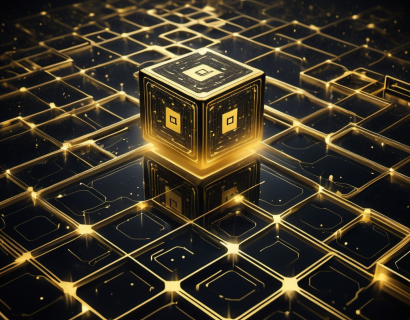Crypto-Powered AI Solutions: Exploring the Future of Decentralized Apps and Services
The intersection of cryptocurrency, artificial intelligence, and decentralized technology is giving rise to a new era of digital innovation. This article delves into the transformative world of decentralized apps and services powered by AI and cryptocurrency, offering insights for tech enthusiasts and early adopters eager to explore the next generation of digital landscapes.
Understanding Decentralized Applications
Decentralized applications, or dApps, are software applications that run on a blockchain or a decentralized network, rather than on a central server. This decentralized nature ensures that no single entity has control over the application, making it more resilient, transparent, and secure. Unlike traditional apps, dApps are not subject to censorship or manipulation by any central authority, which is a significant advantage in an era where data privacy and security are paramount.
Role of Artificial Intelligence in Decentralized Systems
Artificial intelligence (AI) plays a crucial role in enhancing the capabilities of decentralized applications. AI algorithms can process vast amounts of data, identify patterns, and make predictions, all of which are invaluable in a decentralized environment. By integrating AI with blockchain technology, developers can create smarter, more efficient, and autonomous dApps that can adapt to changing conditions and user needs.
Benefits of Crypto-Powered AI Solutions
The combination of cryptocurrency and AI offers several key benefits:
- Decentralization: Cryptocurrency enables the creation of decentralized systems where no single entity has control, reducing the risk of censorship and increasing trust.
- Transparency: Blockchain technology provides a transparent ledger of all transactions and interactions, ensuring accountability and reducing fraud.
- Security: The cryptographic nature of blockchain and AI enhances the security of dApps, protecting user data and ensuring the integrity of the system.
- Automation: AI can automate complex tasks within dApps, reducing the need for human intervention and increasing efficiency.
- Smart Contracts: AI can be integrated with smart contracts to create self-executing agreements that automatically enforce the terms of an agreement when predefined conditions are met.
Use Cases of Crypto-Powered AI Solutions
The potential applications of crypto-powered AI solutions are vast and varied. Here are some notable use cases:
Finance and Banking
In the financial sector, decentralized finance (DeFi) platforms leverage AI to offer innovative services such as decentralized lending, borrowing, and trading. AI algorithms can analyze market trends, predict price movements, and optimize investment strategies, all within a transparent and secure framework.
Supply Chain Management
AI-powered dApps can enhance supply chain transparency and efficiency. By tracking products from origin to destination using blockchain, businesses can ensure authenticity, reduce fraud, and optimize logistics. AI can predict demand, manage inventory, and automate processes, leading to significant cost savings and improved customer satisfaction.
Healthcare
In healthcare, the combination of AI and blockchain can revolutionize patient data management, drug development, and medical research. AI can analyze vast datasets to identify patterns and predict disease outbreaks, while blockchain ensures the secure and privacy-preserving sharing of medical records and research data.
Internet of Things (IoT)
IoT devices generate enormous amounts of data, which can be processed and analyzed using AI to optimize performance and predict maintenance needs. Decentralized IoT networks powered by blockchain can enhance security and privacy, ensuring that data is managed and shared in a trustworthy manner.
Challenges and Considerations
While the potential of crypto-powered AI solutions is immense, there are several challenges and considerations to keep in mind:
Scalability
Blockchain networks, especially those using proof-of-work consensus mechanisms, can face scalability issues. High transaction fees and slow processing times can hinder the widespread adoption of dApps. Layer 2 solutions and more efficient consensus mechanisms are being developed to address these challenges.
Regulatory Environment
The regulatory landscape for cryptocurrency and blockchain technology is still evolving. Developers and businesses must navigate varying regulations across jurisdictions to ensure compliance and avoid legal issues.
User Adoption
Educating users about the benefits and functionalities of decentralized apps is crucial for widespread adoption. User-friendly interfaces and intuitive experiences are essential to attract and retain users.
Interoperability
Ensuring that different blockchain platforms and dApps can communicate and work together seamlessly is a significant challenge. Standardization and cross-chain solutions are being explored to enhance interoperability.
Future Trends and Innovations
The future of crypto-powered AI solutions is exciting, with several trends and innovations on the horizon:
Quantum Computing
The advent of quantum computing could significantly impact blockchain and AI. While quantum computers have the potential to break current cryptographic algorithms, they also offer new opportunities for more powerful and efficient AI computations.
Decentralized Machine Learning
Decentralized machine learning (ML) allows for the training of AI models across multiple nodes in a decentralized network. This approach can enhance privacy, reduce data silos, and improve the robustness of AI models by leveraging diverse data sources.
Tokenized AI Models
Tokenizing AI models on blockchain platforms can create new economic models for AI development and deployment. This approach allows for the trading and monetization of AI models, fostering innovation and collaboration in the AI community.
Enhanced User Privacy
Privacy-preserving technologies such as zero-knowledge proofs and homomorphic encryption, when combined with blockchain and AI, can create dApps that protect user privacy while still delivering powerful and personalized services.
Conclusion
The convergence of cryptocurrency, AI, and decentralized technology is paving the way for a new generation of digital applications and services. These crypto-powered AI solutions offer enhanced security, transparency, and efficiency, with the potential to transform various industries and aspects of our lives. As the technology matures and challenges are addressed, the future looks promising for those who are ready to embrace this revolutionary digital landscape.



